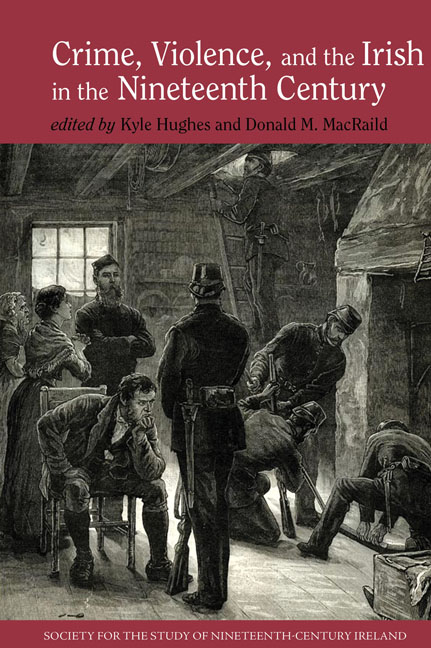Book contents
- Frontmatter
- Contents
- List of Illustrations
- List of Contributors
- Introduction: Crime, Violence, and the Irish in the Nineteenth Century; Themes and Perspectives
- Section 1 ‘Secret Societies’ and Collective Violence
- Section 2 The Law and its Responses
- Section 3 Sectarianism and Violence
- Section 4 Manifestations of Crime and Violence
- 11 Arson in Modern Ireland: Fire and Protest before the Famine
- 12 The Head Pacificator and Captain Rock: Sedition, Suicide, and Honest Tom Steele
- 13 ‘Skin the Goat's Curse’ on James Carey: Narrating the Story of the Phoenix Park Murders through Contemporary Broadside Ballads
- 14 Attitudes and Responses to Vagrancy in Ireland in the Long Nineteenth Century
- Index
13 - ‘Skin the Goat's Curse’ on James Carey: Narrating the Story of the Phoenix Park Murders through Contemporary Broadside Ballads
from Section 4 - Manifestations of Crime and Violence
- Frontmatter
- Contents
- List of Illustrations
- List of Contributors
- Introduction: Crime, Violence, and the Irish in the Nineteenth Century; Themes and Perspectives
- Section 1 ‘Secret Societies’ and Collective Violence
- Section 2 The Law and its Responses
- Section 3 Sectarianism and Violence
- Section 4 Manifestations of Crime and Violence
- 11 Arson in Modern Ireland: Fire and Protest before the Famine
- 12 The Head Pacificator and Captain Rock: Sedition, Suicide, and Honest Tom Steele
- 13 ‘Skin the Goat's Curse’ on James Carey: Narrating the Story of the Phoenix Park Murders through Contemporary Broadside Ballads
- 14 Attitudes and Responses to Vagrancy in Ireland in the Long Nineteenth Century
- Index
Summary
When Invincible-turned-informer, James Carey (1845–83), turned Queen's evidence against his fellow conspirators in the murders of Undersecretary, Thomas Henry Burke (1829–82), and newly appointed Chief Secretary, Lord Frederick Cavendish (1836–82), in the Phoenix Park, Dublin in 1882, he became ‘that false hearted traitor of Ireland’. Carey's betrayal led to the execution of five men, penal servitude for nine men, a guaranteed safe passage out of Ireland for him and his family and a monetary reward. His freedom, however, was short-lived as he was murdered en route to Natal, South Africa by Donegal man, Patrick O'Donnell (1835–83). Georges Denis Zimmermann notes that the murders, trials, and executions captured the popular imagination and were the last major event to be dealt with so extensively in broadside ballads, with an unprecedented thirty songs written on the subject. These broadsides provide important insights into the cultural and political landscape of the time. They are a valuable source of social commentary and oral history and reflect the voice and views of ordinary people. This chapter narrates the story of the Phoenix Park murders as recounted in a number of contemporary broadside ballads. I examine prominent characters, in particular representations of James Carey, and explore common themes and language used.
Broadsides written about the Phoenix Park murders and subsequent executions are housed in a number of libraries and archives, namely the National Library of Ireland, National Library of Scotland, Notre Dame Collection, Ballad Sheet scrapbooks of P.W. Joyce at the Irish Traditional Music Archive (ITMA), Bodleian Library, University of Oxford, J.D. White Collection at Trinity College Dublin, and some private collections. These broadsides fall loosely into three categories: broadsides written in the immediate aftermath of the murders of Burke and Cavendish which were critical of the murders and murderers; broadsides portraying the murderers as martyrs and/ or demonising James Carey for informing on his associates, and, lastly, those celebrating the murder of Carey and praising his avenger, Patrick O'Donnell. The broadsides tell of violence, conspiracy, paid informers, protective custody, secret societies, disguise, and the justice of revenge. Notwithstanding the broadsides’ occasional paucity of historical accuracy and frequent dismissal as low-class street literature, they present a further window into the reactions of ordinary people to the murders of 1882 and the repercussions.
- Type
- Chapter
- Information
- Crime, Violence and the Irish in the Nineteenth Century , pp. 243 - 263Publisher: Liverpool University PressPrint publication year: 2017

